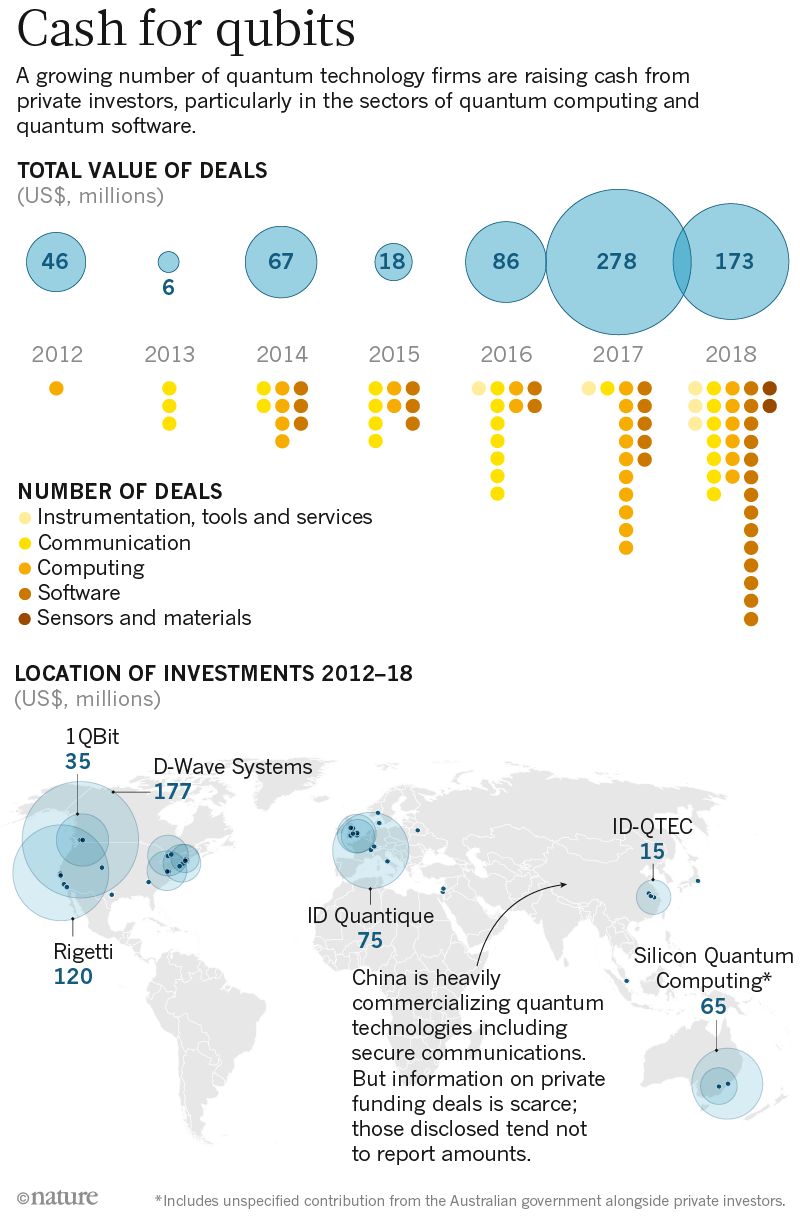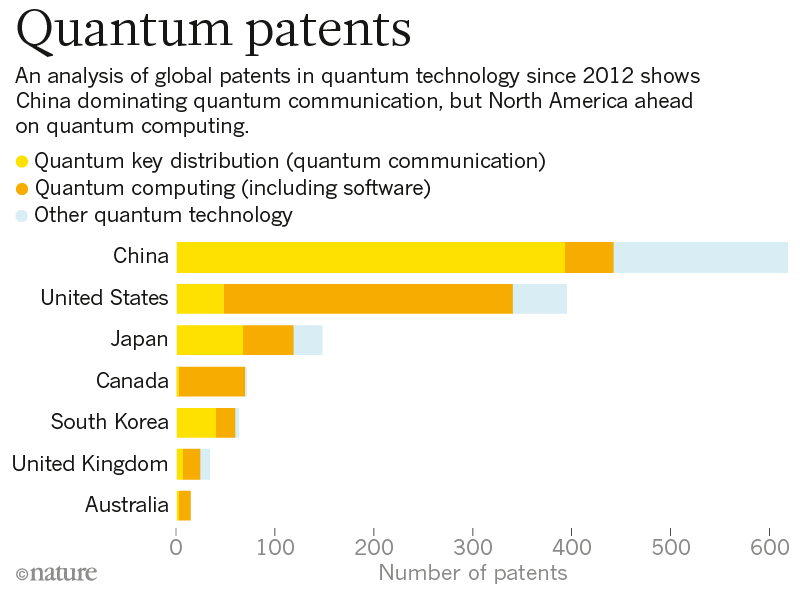Like the AI a few years ago, the field of quantum technology set off a “gold rush”.
Editor’s note: This article from the micro-channel public number “ AI front ” (ID: ai -front), by Elizabeth Gibney.
AI frontline guide:< /p>
Indecision, quantum mechanics; style jumping, virtual world; unreasonable interpretation, crossing time and space; not understanding color, cyberpunk; brain hole is not enough, parallel universe; picture old, pursuing retro; unclear, Pay tribute to Cthulhu.
After the concept of quantum technology appeared, it was found in almost all science fiction and movies. Regardless of whether it is strongly related or not, as long as you encounter a problem that cannot be explained, it is explained by the concept of quantum technology, as if quantum technology is omnipotent.
With the advancement of technology, quantum technology has gradually become truly accessible from the concept of illusory, and technology companies from all over the world have joined in.
Google
,
Microsoft
,
IBM
Other big companies are the first to gain the upper hand in quantum programming languages, quantum chips and other fields.
The wind of quantum technology has become more and more powerful, and of course it has attracted the attention of the capital market. In addition to the country’s strong investment, private capital has also begun to influx – just like the artificial intelligence market a few years ago, even though it still exists. With the technical bottleneck, it is impossible to block the investment enthusiasm of the capital side. After all, most people have defaulted: the return of this “gamble” is considerable.
So, in the quantum gold rush, how many people can return to Jinshan as they wish?
“Nature” magazine may provide some insights into the analysis of investors who bet on quantum technology.
at Yale University in New Haven, Conn city, Robert Schoelkopf is the production of a refrigeration device can be a superconducting qubit cooled to just above absolute zero cryogenic state. Robert Schoelkopf has been built on the foundations of quantum computer research unit has invested more than 15 years. Until 2015, he finally realized that to build a real quantum computer’s time. The physicist at Yale University, along with his colleagues, was born began to introduce startups Quantum Circuits Ltd to investors, hoping to persuade venture capitalists to invest the funds quantum computing market. Within two years, the team raised 180At $0 million, the grant helped them build a professional laboratory in the technology park around Yale University in New Haven, Connecticut, and employed about 20 scientists and engineers. For Schoelkopf, venture capital is definitely an unfamiliar area. But he has been successful, and many other quantum physicists have also been favored by venture capitalists. For a long time, the government and major technology giants have been working on quantum science and have invested billions of dollars in this field in the past few years. As this support increases, external investors also hope to enter this emerging industry as soon as possible. According to an analysis published by Nature, to the beginning of this year, private investors have funded at least 52 quantum technology companies globally over the past seven years, most of which are sourced from university scientists. Entrepreneurship project. (Academia has established more start-ups that have not yet completed financing.) Although a significant portion of financing activities have not announced specific amounts, Nature has listed information on several recent public financing activities. The survey found that between 2017 and 2018, quantum computing-related companies received at least $450 million in private capital injections, more than four times the total of $104 million previously disclosed in the previous two years. . Among them, venture capital accounts for the majority. Christopher Monroe, a physicist at the University of Maryland’s Parker College who founded the quantum computing company IonQ in 2015, said: “Many companies in the California Silicon Valley Venture Capital Center are already in trouble, but for other companies that still have a lot of energy, quantum computing has Be the most important direction of attention.” There is no doubt that quantum technology will eventually lead to practical and potentially revolutionary products. In addition to government investment, there are hundreds of other companies competing for investment in this field. IBM, Google, Alibaba, Hewlett-Packard, Tencent, Baidu and Huawei also have their own research projects. According to the report, Google has built a quantum computer that solves the specific problem that the most powerful classic computers can’t handle—in other words, Google has achieved the milestone of “quantum first”. In addition, the use of quantum technology for secure encryption has been applied in commercial products, and some quantum technologies enable large-scale sensing, imaging or measurement in an extremely precise manner. D-Wave Sy in Burnaby, CanadaStems has even begun to sell computers that use quantum effects – but these devices are not general-purpose quantum computers and are only suitable for handling specific tasks, or optimization problems. However, venture capitalists believe they should deliver money to companies that are expected to change the rules of the computing industry, especially the multi-function quantum computers they may be able to handle in a variety of currently infeasible computing tasks. From an investor’s perspective, as of now, the amount of money invested in this area is still quite limited each year – just the amount of venture capital associated with artificial intelligence before 2010. (By 2018, venture capital investment in the US into the AI sector has surged to $9.3 billion.) Of course, for quantum computing, a non-mature business area that lacks clear output, the current amount of capital injection has been quite considerable. At the same time, some software companies have begun to promote the quantum algorithm solution, and hope to provide a software development tool for these non-existent hardware. Many people worry that the hype about quantum computing will eventually turn into a bunch of bubbles. Doug Finke, a computer scientist at the Quantum Computing Report in Orange County, Calif., said: “The current hype is really serious.” Finke explained that quantum technology has indeed achieved rapid growth, but distance The actual equipment that can really handle multiple computing tasks is still going to have decades of development. And even then, it would be quite difficult to write algorithms that take full advantage of quantum computing. Some venture capitalists are willing to believe that quantum computing will soon break through, that is, to build a viable universal quantum computer within the next five to ten years. However, other investors believe that it is advisable to pay for the money first, and then wait until the technology has made some progress before the other companies will “take over.” There are also many people who hope that scientists can find a relatively small, not too comprehensive quantum computer application scenario, which will quickly boost people’s confidence in quantum computing. These use cases may be limited to solving specific problems, such as simulating reactions in quantum chemistry or optimizing financial models. Its performance may not be comparable to a classic computer with unlimited computing resources, but it is still enough to create the actual product that can be sold. The National Institute of Science, Engineering and Medicine warned in a December 2018 report that if these early quantum computers could not find a profitable direction as soon as possible, then they are likely to face investment stagnation. “Death Valley” dilemma. Some researchers are even worried that quantum computing will encounter a quagmire that is similar to the “artificial intelligence winter”, which has rapidly declined after the surge. Finke said that there is alreadyThere are signs that it is increasingly difficult for US companies to obtain private investment. He explained that up to 70% of the investment recorded this year came from abroad. Christian Weedbrook, founder of Xanadu, a Toronto-based quantum computing company, also believes that “the value of quantum computing is indeed quite a lot. The current problem is that the level of speculation may be much higher than the true value.” Xanadu’s room temperature quantum chip, based on Light beams (photons) carry information to develop quantum bits. Quantum technology has changed our daily lives. Computers, mobile phones, medical imaging, lasers, and even superconductors all originated from the science of someone born in the early twentieth century. The physicists at the time solved the inner workings of the atom through quantum mechanics. However, today’s quantum technology is no doubt going faster and farther in manipulating and exploiting this fragile law of quantum activity. The superposition state is the representative of it. The phenomenon that such particles seem to be in multiple superposition states before being actually observed has been accepted, and the description of quantum entanglement has various properties of quantum systems (such as the spin of particles). Polarization) is really combined. The resulting quantum technology includes unbreakable encryption mechanisms, extremely sensitive detection devices, and new imaging formats. If scientists can really turn this into reality, then the most important game-changer of general-purpose quantum computers will no longer be a dream. Through the entanglement properties of quantum bit sets, general-purpose quantum computers will be able to perform computational tasks such as database searches and achieve large-scale factorization at much higher speeds than traditional computers. Monroe said: “Unless we build a quantum computer, such problems will never be solved quickly.” To analyze business transactions in this area, Nature has cross-referenced information from quantum start-ups from various market research websites and consulting reports, as well as surveys provided by PitchBook, a market research firm in Seattle, Washington. data. From the results, companies that focus on developing physical quantum bits (that is, quantum computing hardware) account for the largest share of venture capital. Schoelkopf’s company uses a very fine superconducting ring to cool the qubits to near absolute zero. In fact, superconducting qubits are the most in-depth research direction in the field of quantum computing hardware. The technology giants such as Google and IBM are also taking this path. (The investment inside large technology companies may also be very impressive, but since it is not publicly disclosed, we cannot analyze it.Be explained. Google’s largest quantum computer currently has 72 qubits, but a general-purpose quantum computer requires about 1 million qubits. Monroe’s company chose another promising technology: building a magnetic field to capture cesium ions, and then using a laser to read the information carried on the ions. Other companies focus on developing other hardware that is still in the early stages of research and are committed to making it easier to achieve mass production. Quantonation is a Paris-based venture capital fund established in 2018 to focus on investing in “deep physics” startups. Christophe Jurczak, founder and managing partner of the fund, said that research in this area is getting more and more attention from investors. Since 2017, companies that have developed quantum-based hardware based on photonics and silicon have received tens of millions of dollars in venture capital. PsiQuatum, from Palo Alto, Calif., is committed to bringing out research and development beyond competitors, and plans to build the first computer with millions of qubits in about eight years. In order to achieve this breakthrough, they chose an unusual design idea to generate quantum bits using photons etched into the grooves of the silicon chip. According to Jeremy O’Brien, CEO of the company, the advantage of this approach is that existing semiconductor manufacturers are sufficient to produce chips capable of carrying these qubits. O’Brien worked at the University of Bristol in the UK and was involved in the creation of the company in 2016. Although many scholars have expressed doubts about the company’s claims, O’Brien’ pointed out that they are a few quantum technology companies that have received huge investments and currently have about 100 employees. Although the company did not announce the specific amount, it should have raised a number of dollars in the dollar. Quantum software has also become a major focus of private investment. From 2012 to the end of 2018, a total of 20 companies raised more than $110 million through 28 transactions. These companies are designing algorithms that solve real-world problems, such as optimizing supply chain logistics design or simulating molecular activities for drug development, and hope to develop software solutions that can actually run on early quantum computers. The funds for developing software often come from “strategic” venture capital companies, which usually have a strong parent group background behind them. Matt Johnson, co-founder and CEO of Palo Alto’s quantum software vendor QC Ware (financing $6.5 million in 2018), points out that startups use the money they raise to drive technology development and generate real profits. But he also admits that because of the limited profits, quantum software is still difficult to attract the attention of investors who are concerned about earnings. This is currentlyThere are several software start-ups that have received tens of millions of dollars in financing – including Zapata Computing from Cambridge, Massachusetts, 1Qbit from Vancouver, Canada, and Cambridge Quantum Computing in the UK. Yianni Gamvros, head of business development at QC Ware, said that although quantum algorithms have not really benefited people, investors already have money to support them. The company has signed cooperation agreements in various fields such as aerospace and is expected to provide new computing support in the coming decades. In the financial sector, a small advantage can bring huge benefits. He said the company is developing an algorithm that hopes to help these industries solve the biggest bottlenecks they face today on early quantum computers. In fact, many companies are still more concerned about the impact of AI technology on their business. Gamvros pointed out: “Compared with AI investment, the financial needs of quantum computing are actually very small, but the potential is huge.” Calculation is not the only direction in which quantum technology can attract funding. Qnami, a Swiss startup based in Basel, received $130,000 in 2018 to develop a quantum magnetic microscope capable of capturing individual electrons in synthetic diamonds. At present, there are at least three companies like them that can raise a small amount of private funds for imaging or sensing technology exploration. In addition, the amount of financing related to communication, one of the most popular directions in the quantum field, is difficult to quantify. In principle, quantum communication uses entangled photons to create encryption keys that fully secure data transmission. A total of 13 companies engaged in secure quantum communications have disclosed a total of 27 financing transactions, but only about half of them have disclosed the amount of financing. Leaders in this field are Keda Guodun Quantum Technology Co., Ltd. located in Hefei, Anhui Province, China, and Tianquan Quantum Technology Co., Ltd., located in Wuhu City, Anhui Province, but neither has disclosed specific financing figures. In Switzerland, ID QUantique from Geneva installed its first short-range system for quantum cryptography of ballot information in regional elections in 2007. Now, Chinese engineers are pushing quantum communications to the world to expand the initial 2000 km quantum transmission link installed in 2014. In addition, with the successful launch of the Mozi satellite in 2016, the quantum satellite network was established. If quantum computers can crack the most powerful traditional encryption technology, then future quantum encryption may become the only secure communication solution. North America has long been the world’s largest market for venture capital investment, and Nature’s analysis shows that it still maintains this dominant advantage. However, prosperity is no longerOnly the Silicon Valley area. Led by quantum computing pioneer D-Wave Systems, Canadian quantum-related companies attracted $243 million in investment, and D-Wave Systems alone raised $177 million. According to Jurczak, the resulting ecosystem has been established to support the Quantum-related technology companies around Waterloo and the Toronto Academic Center. With public and philanthropic investments, considerable tax incentives, and support for incubators, these companies have achieved good growth. Xanadu’s Weedbrook pointed out: “Here, quantum technology companies have gained good resonance and communication channels. In addition, the strict control of immigration in the United States has made Canada a good choice for talented quantum physicists. We see talents being Flowing to Canada, this is undoubtedly good news for us.” In Nature, the biggest gap in the analysis is the lack of investment information from China. English-language media and Western analysts rarely publish China-related financing transactions because such transactions often involve state-backed venture capital firms, and financing details are rarely publicly announced. Of the data currently collected, only one in ten Chinese companies disclose the specific amount in their financing transactions. Pan Jianwei, a quantum physicist at the University of Science and Technology of China in Hefei, said that China has made good progress in the commercialization of various quantum technologies. HKUST Guodun Quantum Technology Co., Ltd. is the company that he derived from the laboratory results in 2009. Patents are another major sign of the rapid development of China’s quantum technology. According to data collected by the European Commission Joint Research Centre in Ispra, Italy, more than 43% of all patented quantum technology innovations came from Chinese companies and universities between 2012 and 2017. Strong>. Celia Merzbacher, deputy director of the American Quantum Economic Development Alliance in Arlington, Va., points out that China has “always been radical in patent applications, especially in communications-related areas.” The whereabouts of private funds in other parts of the world also reflect research hotspots. A small amount of investment exists in Australia, Singapore, the UK and throughout Europe. However, European investors tend to be more risk-averse and have a relatively limited budget. However, the EU announced its flagship project worth 1 billion euros (US$1.1 billion) in 2018 to ensure that Europe can transform its basic research advantages into business.success. In addition, the United States, the United Kingdom, Japan, Sweden, Singapore, Canada, and China have also invested heavily in similar public investment plan vector sub-technologies. The bottleneck of quantum technology Schoelkopf and other college scientists who have established start-ups are still continuing their research on campus, hoping to make breakthroughs in quantum technology as early as possible. But a few people (such as O’Brien of PsiQuantum) have completely left the academic world. Even so, the thriving of quantum start-ups means that today’s qualified quantum engineers are beginning to become extremely scarce resources in the talent market – similar to the AI industry, which is using a considerable salary to take academics out of colleges and universities. . Weedbrook pointed out: “I think this issue has deserved serious attention.” In fact, efforts must be made to increase training to increase talent output: US President Trump signed a US$12 billion US national quantum in December 2018. The main content of the plan is to emphasize the importance of cultivating a new generation of quantum technology-related talents. At the same time, there are also many companies that have high expectations for the technical solutions they can deliver. Monroe pointed out: “ There is a serious hype in this area, and even on the surface, many promises are simply not realistic – but some are still supported by funds.“ The researchers have not announced which projects or corporate hype issues are particularly serious, but WeedBrook said that from the perspective of investment size, it can be found that companies that focus on quantum software development may be a bit “unworthy.” Some of these companies have raised tens of millions of dollars in funding, but the actual physical equipment or facility requirements simply do not reach this scale. Weedbrook warned: “The amount of such an amazing financing seems to indicate that there is hype.” His company is of course different, and it is also promoting the development of quantum hardware and software. But quantum software companies have different opinions about this. Their work requires capital investment, and it also needs to train and recruit more outstanding employees. Christopher Savoie, CEO of the quantum software company Zapata Computing (which just raised $21 million earlier this year), says software companies face another big challenge—they can’t take a two-year typical financing cycle like a traditional one. He pointed out that this is because people are not sure when the hardware solution for matching quantum software will appear, so companies need a lot of money to attract scientists to bid farewell to their stable academic research positions. But some people are optimistic about this. O’Brien believes that although the active investment of venture capital firms is indeed suspected of speculation, he believesAs long as there is no problem in the general direction, these are not important. In his view, although the principles of quantum physics seem counterintuitive, compared with many other technologies, such technologies are not difficult to understand in essence. Finke pointed out: “The field of quantum technology does have many magical and quirky principles and phenomena, but transistor technology is the same.” If the 2019 data finally shows that private investment in quantum technology in the United States is slowing, it may be mainly due to concerns about the quantum winter or the long period of profitability of quantum-related companies. He added that the increasingly fierce market competition among many start-ups may have a certain impact, or investors worry that the Sino-US trade war may lead to economic cooling. Merzbacher believes that there is a hype cycle in any emerging technology market, “the news reports and technology bubbles that will follow in the future will gradually disappear.” She also stressed that people now have a full understanding that quantum technology will bring about subversive progress. “This question has already occurred and will happen.” Schoelkopf said that there are indeed some companies that have made too big a development commitment in a short period of time. But in his view, the current industry is too pessimistic about the development cycle of general-purpose quantum computers. He concluded, “A decade ago, we were all wrong about all the technological developments we are making now, and they are too conservative. Innovative hardware will eventually be combined with software that can solve the toughest problems, and this is powerful. The partner will allow us to achieve practical quantum computing capabilities earlier than expected.” Original link: https://www.nature.com/articles/d41586-019-02935-4
Qubit Bit Battle
Geographic distribution of quantum investment



